
The Workers' Party is a centre-left to left-wing political party in Brazil that is currently the country's ruling party. Some scholars classify its ideology in the 21st century as social democracy, with the party shifting from a broadly socialist ideology in the 1990s, although the party retains a marginal far-left faction to this day. Founded in 1980, PT governed at the federal level in a coalition government with several other parties from 1 January 2003 to 31 August 2016. After the 2002 parliamentary election, PT became the largest party in the Chamber of Deputies and the largest in the Federal Senate for the first time. With the highest approval rating in the history of the country, President Luiz Inácio Lula da Silva is PT's most prominent member. Dilma Rousseff, also a member of PT, was elected twice but did not finish her second term due to her impeachment in 2016. The party came back to power with Lula's victory in the 2022 presidential election.
The Brazilian Social Democracy Party, also known as the Brazilian Social Democratic Party or the Party of Brazilian Social Democracy, is a political party in Brazil. As the third largest party in the National Congress, the PSDB was the main opposition party against the Workers' Party (PT) administrations of Luiz Inácio Lula da Silva and Dilma Rousseff from 2003 to 2016.

The Democratic Labour Party is a political party in Brazil.
Cidadania is a Brazilian political party. It was originally founded as the Popular Socialist Party by members of the former Brazilian Communist Party (PCB), as a centre-left social democratic and democratic socialist party. Despite its left-wing alignment, PPS moved to be opposition against the Workers' Party since 2004, forming alliances with centre-right parties, in particular the Brazilian Social Democracy Party (PSDB), and supporting the Impeachment of Dilma Rousseff. Later the party's National Convention adopted the new naming in March 2019, and it was later approved by the Superior Electoral Court that September. The party then began moving towards a more social liberal position akin to the third way.

The Brazilian Socialist Party is a political party in Brazil. It was founded in 1947, before being abolished by the military regime in 1965 and re-organised in 1989 after the re-democratisation of Brazil. It elected six Governors in 2010, becoming the second largest party in number of state governments, behind only PSDB. In addition to that, it won 34 seats in the Chamber of Deputies and three seats in the Senate, besides having been a member of the For Brazil to Keep on Changing coalition, which elected Dilma Rousseff as President of Brazil.

Geraldo José Rodrigues Alckmin Filho is a Brazilian physician and politician who has served as the 26th vice president of Brazil since 1 January 2023. He previously served as the Governor of São Paulo from 2001 to 2006, and then again from 2011 to 2018, the longest term served in that state since the end of the Military dictatorship in Brazil. He was the Brazilian Social Democracy Party (PSDB) presidential nominee for the 2018 Brazilian presidential election, when he finished in fourth place, as well for the 2006 Brazilian presidential election, when he came in second place, losing in the runoff to then president Luiz Inácio Lula da Silva.
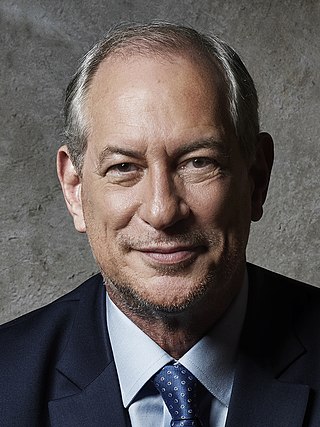
Ciro Ferreira Gomes, known mononymously as Ciro, is a Brazilian politician, lawyer, and academic. Ciro is currently affiliated with and vice-president of the Democratic Labour Party (PDT).

Anthony William Matheus de Oliveira, also known as Anthony Garotinho, is a Brazilian politician, radio broadcaster and convicted felon. He legally adopted his stage name "Garotinho", originally a nickname he took while working as a radio sports broadcaster.

The Liberal Party is a centre-right to right-wing political party in Brazil. From its foundation in 2006 until 2019, it was called the Party of the Republic.
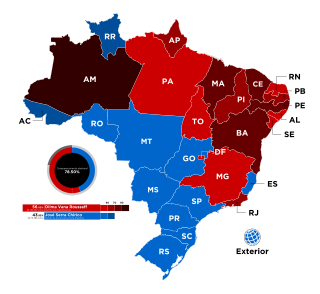
General elections were held in Brazil on 3 October 2010 to elect the president, National Congress and state governors. As no presidential candidate received more than 50% in the first round of voting, a second round was held on 31 October to choose a successor to Luiz Inácio Lula da Silva of the Workers' Party (PT), who was constitutionally ineligible to run for a third term as he has already served two terms after winning the elections in 2002 and being re-elected in 2006.
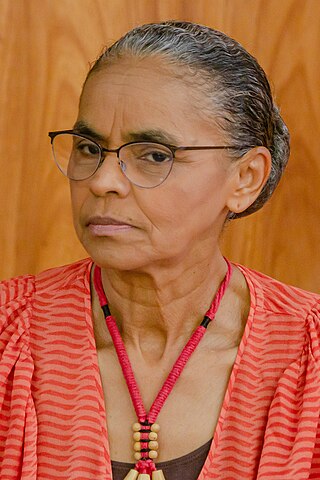
Maria Osmarina Marina da Silva Vaz de Lima, known as Marina Silva, is a Brazilian politician and environmentalist and current Brazil's Minister of the Environment and Climate Change. She is the founder and former spokeswoman for the Sustainability Network (REDE). During her political career, Silva served as a senator of the state of Acre between 1995 and 2011 and Minister of the Environment from 2003 to 2008. She ran for president in 2010, 2014 and 2018.

Presidential elections were held in Brazil in 1989, with the first round on November 15 and a second round on December 17. They were the first direct presidential elections since 1960, the first to be held using a two-round system and the first to take place under the 1988 constitution, which followed two decades of authoritarian rule after the 1964 Brazilian coup d'état.
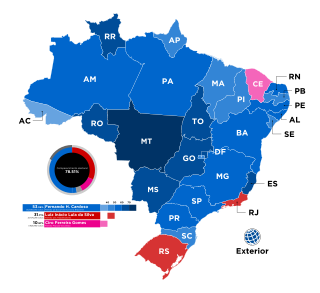
General elections were held in Brazil on 4 October 1998 to elect the President, National Congress and state governorships. If no candidate in the presidential election received more than 50% of the vote in the first round, a second-round runoff would have been held on 25 October. The election saw voting machines used for the first time in Brazilian history.

General elections were held in Brazil on 6 October 2002, with a second round of the presidential election on 27 October. The elections were held in the midst of an economic crisis that began in the second term of the incumbent president, Fernando Henrique Cardoso of the centre-right Brazilian Social Democracy Party (PSDB). Due to constitutional term limits, Cardoso was ineligible to run for a third consecutive term.
Socialism in Brazil is generally thought to trace back to the first half of the 19th century. There are documents evidencing the diffusion of socialist ideas since then, but these were individual initiatives with no ability to form groups with actual political activism.

The Brazilian Labour Party was a political party in Brazil registered in 1981 by Ivete Vargas, niece of President Getúlio Vargas. It claimed the legacy of the historical PTB, although many historians reject this because the early version of PTB was a center-left party with wide support in the working class. It was the seventh largest political party in Brazil with more than a million affiliated as of 2022.
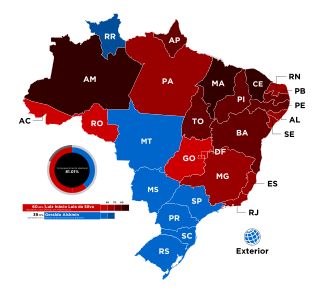
General elections were held in Brazil on 1 October 2006 to elect the president, National Congress and state governors, with a second round of the presidential election on 29 October as no candidate received more than 50% of the vote in the first round.
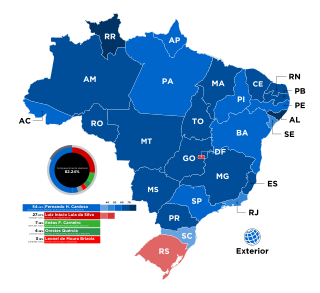
General elections were held in Brazil on October 3, 1994, the second to take place under the provisions of the 1988 constitution and the second direct presidential election since 1960.

General elections were held in Brazil on 7 October 2018 to elect the president, National Congress and state governors. As no candidate in the presidential election received more than 50% of the vote in the first round, a runoff round was held on 28 October.
General elections will be held in Brazil on 4 October 2026 to elect the president, vice president, members of the National Congress, the governors, vice governors, and legislative assemblies of all federative units, and the district council of Fernando de Noronha. If no candidate for president—or for governor in some states—received more than half of the valid votes in the first round, a runoff election for these offices will be held on 31 October.
















